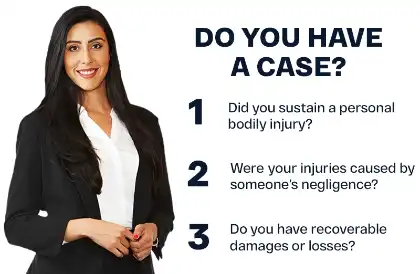TL;DR: Car accidents are the number one cause of paralysis injuries. Falls, acts of violence, and sports accidents follow closely behind. If your paralysis is due to negligence, call Arash Law at (888) 488-1391 for a free consultation.
Table of Contents
The number one cause of paralysis injuries in the U.S. is car accidents. Motor vehicle crashes account for spinal cord injuries that occur when the force of a collision fractures, dislocates, or compresses the spinal cord. The result can be partial or total paralysis, depending on the location and severity of the injury.
Falls are the second most common cause of paralysis injuries, followed by acts of violence and sports accidents. While stroke is the overall leading cause of paralysis, it is generally classified as a medical condition, not an injury, and is therefore not included when discussing paralysis injuries.
Because paralysis injuries often create lifelong medical, financial, and emotional challenges, it is important to understand their common causes and the legal rights of those affected. To give you a quick overview, here are the key points covered in this blog:
- Car accidents are the number one cause of paralysis injuries.
- Falls, violence, and sports accidents are other major contributors.
- The severity of paralysis depends on where the spinal cord is injured.
- Paralysis injuries create high medical and financial costs.
- Preventive safety measures can reduce risks.
- Legal options may be available if negligence is proven to have caused the injury.
By keeping these points in mind, you can better understand the risks of paralysis injuries and how they may affect your future. Medical treatment should always be the top priority, but understanding your legal rights can also help alleviate long-term challenges and protect your financial stability.
What Is The Leading Cause Of A Paralysis Injury?
The main cause of paralysis injuries in the U.S. is car accidents. Crashes with cars, trucks, motorcycles, or pedestrians cause nearly 4 in 10 new spinal cord injuries each year. A collision can cause spinal cord injuries (SCIs), stopping the brain from sending signals to the body. This can lead to paralysis in the legs or, in more serious cases, all four limbs. A U.S. study on paralysis found that SCIs account for 27.3% of all paralysis cases.
Falls, violence, and sports accidents also cause paralysis injuries, but they are less common than motor vehicle crashes. Strokes cause the most paralysis overall, but since they result from health problems rather than accidents, they are counted separately.
What Are The Common Causes Of Paralysis Injuries?
According to a study, the most common cause of new SCI cases in the U.S. is motor vehicle accidents. In older adults, falls are the next most common cause, as even a minor slip can result in significant spinal damage.
Other common causes include acts of violence, such as gunshot or stab wounds, which often lead to serious injuries to the spine. Sports and recreational activities can also be risky. Medical conditions, such as infections or diseases, can also lead to spinal cord injuries. Even chemical exposure injuries can damage the nervous system and, in some cases, the spinal cord and lead to paralysis.
Here’s a closer look at the primary causes of SCIs:
Motor Vehicle Accidents
Motor vehicle collisions are the leading cause of SCIs, making up about 38% of new cases from 2010 to 2013. These injuries can occur when a crash bends or compresses your spine in the wrong way. Pedestrians and motorcyclists are especially at risk because they have less physical protection.
Some of the common motor vehicle accidents that can lead to SCIs include:
- Truck collisions
- Pedestrian incidents
- Taxi accidents
- Motorcycle crashes
- Bicycle accidents
- Bus crashes
- 18-wheeler accidents
- Self-driving car crashes
- Rideshare accidents like Uber or Lyft
In such accidents, the spinal cord can be injured by a sudden movement, strong pressure, or a hard blow. Rear-end collisions can be particularly hazardous because they generate strong forces that the body is not designed to withstand. Lawyers who handle car accidents often gather evidence, such as traffic camera footage and dash cam videos, to determine liability in such incidents.
After a motor vehicle accident, car accident lawyers may evaluate your circumstances, explain available options, and guide you through the claims process.
Falls
Falls make up about 30% of new SCI cases in the U.S. For adults over 65, it is the number one cause. Examples of slips and falls include:
- Slipping in the bathroom or on other wet surfaces.
- Tripping on stairs or uneven floors.
- Tripping over clutter at home or in public spaces.
- Slipping on icy sidewalks or snow.
- Falling from ladders, scaffolding, or elevated work areas.
- Losing balance due to dizziness or medications.
Even if these accidents seem minor at first, they can cause serious spinal cord injuries. They are especially dangerous if you fall from a high place or hit the ground hard. These injuries can also happen in workplace accidents. When performing physical tasks, using heavy tools or machines, or working in unsafe environments, you must exercise greater care.
Acts Of Violence
Violence, including gunshot wounds and physical assaults, is responsible for about 13% of new SCIs. These injuries may bruise, break, or pierce the spinal cord. With around 45,200 firearm-related deaths and 99,800 nonfatal gunshot wounds in 2020 alone, the U.S. continues to have high levels of gun violence.
In fact, a cross-sectional study in the U.S. revealed that 8.4% of patients with gunshot wounds had injuries associated with the spine. Assaults were the primary cause of these injuries, accounting for nearly 87% of the cases.
Sports And Recreation Injuries
About 9 out of every 100 new spinal cord injuries happen during sports or fun activities. Activities with high speeds or sudden movements are riskier than those with slower speeds or less sudden movements. They can damage the spinal cord or the bones around it, possibly causing temporary or permanent paralysis.
Here are some activities that are more likely to lead to spinal cord injuries:
- Contact sports
- Trampoline
- ATV riding
- Bungee jumping
- Mountain climbing
- Snowboarding or skiing
- Parkour or freerunning
- High-speed biking
- Cave diving
- Surfing
- Diving
Medical Errors
Medical complications account for about 5% of new SCI cases. These often happen when something goes wrong during surgery or follow-up care. If doctors accidentally hurt nerves or don’t watch the patient closely after surgery, it can damage the spinal cord and lead to paralysis.
How To Prevent Paralysis Injuries
Not all injuries can be avoided, but many spinal cord injuries can be prevented by staying safe. Whether you’re driving, working, or having fun outside, keep these safety tips in mind:
- Drive Responsibly — Act responsibly by driving defensively. Avoid distractions, and never drive while intoxicated.
- Use the Right Safety Gear — Wear seatbelts in vehicles and helmets when biking, motorcycling, or engaging in contact sports. Wearing protective gear is your first line of defense during risky activities.
- Follow Sports and Recreation Guidelines — Always warm up before any physical activity. Use the right techniques and follow guidelines for sports and high-risk outdoor activities to ensure safety.
- Use Caution in Water Activities — Never dive into shallow or unfamiliar water. Check the depth first to prevent head or neck injuries that could impact the spine.
- Watch Kids During Risky Activities — Ensure kids wear safety gear and understand the safety rules when engaging in activities.
- Lift Safely — When picking up heavy objects, bend your knees instead of your back and hold the object close to your body. This helps protect your back and spine.
Taking these precautions can help lower your risk of having a spinal cord injury at home, on the road, or during leisure activities.
The Types Of Paralysis Caused By A Spinal Cord Injury
Spinal cord injuries can cause different types of paralysis, depending on where the damage occurs. The severity of an injury is a crucial factor in a personal injury claim, as it impacts medical expenses, daily care, and long-term damages.
- Monoplegia — Paralysis in one arm or leg. Even if some sensation remains, losing movement in a single limb can still affect work and daily activities, which may be considered in a claim.
- Hemiplegia — Weakness or paralysis on one side of the body. This can limit mobility and independence, increasing future care needs that may be recoverable in a claim.
- Paraplegia — Paralysis in both legs and the lower body. This often impacts bowel or bladder control and mobility. These changes can significantly increase medical bills and home modification costs in a claim.
- Quadriplegia (Tetraplegia) — Paralysis in all four limbs, usually from a neck injury. These cases are often the most severe and can involve lifelong care, resulting in significantly higher damages in a claim.
Paralysis affects people in different ways, but in legal terms, the more severe the condition, the greater the potential impact on a personal injury case.
Other Symptoms Of A Spinal Cord Injury
Aside from paralysis, SCIs also lead to other problems in your body. That’s because the spinal cord is a key part of your nervous system, and damage to it causes a range of symptoms and changes in your body.
Depending on your injury’s location and severity, you may experience these symptoms:
- Loss of balance and coordination.
- Loss of bladder and bowel control.
- Changes in sexual function, fertility, and sexual sensitivity.
- Intense stinging sensations or pain at the injury’s location.
- Numb or tingly hands, fingers, feet, or toes.
- Impaired sense of touch and temperature.
- Muscle spasms or hyperreflexia (excessive reflexes).
- Breathing problems, coughing, or releasing phlegm from your lungs.
- Skin issues, such as rashes and bed sores, can occur from inactivity.
- Psychological effects like depression and anxiety.
Spinal cord injuries can lead to a range of symptoms, so it is helpful to be aware of what to look out for. If you suddenly experience a serious health issue, work with your doctor, family, and care team to determine the next steps. Besides providing legal advice, a personal injury lawyer can also assist you in finding the right doctors and therapy programs to ensure you receive the necessary care.
Stroke As Another Major Cause Of Paralysis
While SCIs are the leading cause of trauma-related paralysis, strokes are the overall top cause, accounting for about 33.7% of cases. Strokes usually occur when blood flow to the brain is blocked or when a blood vessel in the brain ruptures. In most cases, health problems lead to strokes more than accidents, injuries, or violence.
However, serious car accidents or head injuries can also lead to a stroke. One of the most common injuries in car accidents is whiplash, which occurs when the head rapidly tilts forward and backward.
In a serious crash, the impact of whiplash can fracture the skull or injure the brain, which can lead to a stroke. In these cases, both an injury and a medical problem can cause paralysis.
Car accident lawyers can help injured individuals understand their legal options when a crash results in such serious complications.
Frequently Asked Questions About Paralysis Injuries
Paralysis injuries can affect many parts of your life, like your health, ability to move, and your finances. If an accident or medical event has left you or a loved one paralyzed, you may have questions. To assist you, we have addressed some of the most frequently asked questions.
What Is The Number One Cause Of Paralysis Injuries?
Spinal cord injuries are the main cause of paralysis. They typically occur after serious accidents, such as car crashes, falls, workplace incidents, or physical altercations. These injuries stop the brain from sending messages to your body, so you lose feeling or the ability to move in some or all parts of your body.
The severity of paralysis paralysis depends on the location of the injury along the spinal cord. Injuries higher up can affect all four limbs, while injuries lower down may only affect the legs or feet.
A 2013 study reported that approximately 1.47 million Americans live with paralysis due to SCIs. It’s important to get medical help right away if you think your spinal cord has been injured.
How Much Does A Spinal Cord Injury Cost?
According to the National Spinal Cord Injury Statistical Center (NSCISC), quality medical care and living expenses can exceed $1 million in the first year after a traumatic SCI. Depending on the severity of the injury, costs may reach hundreds of thousands of dollars each year afterward.
The estimate above doesn’t include indirect costs, such as lost wages or job benefits, which averaged about $95,000 in 2024.
Spinal cord injuries are very costly to treat and live with. The costs can include making your home wheelchair-friendly or creating a bedroom on the first floor. Transportation can also be more expensive if you need a special van.
Although spinal cord injuries can be costly, there may be legal options available to recover expenses. Consider consulting a personal injury lawyer to explore your legal rights.
What Type Of Damages Can I Receive After A Spinal Cord Injury?
If another party’s negligence caused your spinal cord injury, you may be able to get compensation. These can cover both financial losses and the personal impact the injury has had on your life.
- Medical Expenses — You can claim compensation for the fees charged for ER visits, surgery, medications, and therapy, as well as any out-of-pocket costs left after insurance. Keep every bill and receipt.
- Lost Income and Earning Capacity — If your injury keeps you from working, you can get money for the wages you lost now and the money you might lose in the future.
- Home Modifications and Accessibility Costs — You may be eligible for compensation to make your home more accessible, such as adding ramps or widening doors.
- Assistive Devices — You can seek reimbursement for specialized wheelchairs and changes to your car or house to help you get around, along with future replacement costs.
- Replacement Services — If your injury stops you from doing chores like cooking or cleaning, you can include the cost of hiring help.
- Pain and Suffering — These damages show how the injury mentally and emotionally affected you. Medical reports, personal journals, and statements from loved ones can support this part of your claim.
Every case is different, so document your expenses and talk to doctors and accident lawyers to find out what damages you can claim and if you are eligible for them.
What Is The Deadline For Filing A Personal Injury Lawsuit In California?
California law allows you to file a personal injury lawsuit two years after the accident if you sustained a spinal cord injury. This deadline is commonly referred to as the statute of limitations. It applies to most injury cases, including those from car accidents, falls, or other cases caused by someone else’s negligence. If you miss this two-year window, you may lose your legal right to seek compensation for your injuries.
However, if medical malpractice caused your spinal cord injury, different rules apply. Typically, you must file a lawsuit within one year of discovering the injury or within three years from the date of the injury, whichever is earlier. Minors who sustain injuries due to medical malpractice typically have three years to file a lawsuit.
A California injury attorney can guide you through the claims process and help you meet deadlines.
What Can I Do If My Insurer Denies My Claim?
If your insurance company says no to your spinal cord injury claim, you can take these steps to challenge the decision:
- Start by filing an appeal, which involves writing a detailed letter to the insurer explaining why the denial is unreasonable. Attach supporting documents and follow your insurance company’s appeal process.
- If the appeal doesn’t work, you can file a complaint with the California Department of Insurance (CDI) or the insurance department in your state. They may review your case and investigate if the insurance company acted unfairly.
- If your insurance company still refuses to pay and acts in bad faith, you may have grounds to file a lawsuit. A personal injury attorney can look at your case and help you figure out the possible next steps.
How Can A Personal Injury Lawyer Help A Paralyzed Person?
If you become paralyzed because of what someone did or didn’t do, a personal injury lawyer can help you find out what legal options you have. Here’s how they can help:
- Investigate the Case and Determine Who’s at Fault — They can collect photos, reports, and witness statements to determine who caused the injury.
- Negotiate with Insurance Companies — Insurance companies might offer you a quick but unfairly low amount of money. An injury lawyer can negotiate for a better settlement that truly reflects what you’ve lost.
- Handle Legal Paperwork and Deadlines — Your lawyer can manage all forms and file any paperwork on time.
- Work With Medical Experts — An attorney can consult with your doctors to gain a better understanding of your injury. By doing so, they can determine what kind of care you may need in the future.
- Represent You in Court — If you cannot reach a fair settlement, your lawyer may recommend taking your case to court.
If you’re thinking, “I need a personal injury lawyer” after a paralysis injury, you’re not alone. Personal injury lawyers can guide you through your legal options, protect your rights, and help you pursue the compensation you may be entitled to under California law.
Free Initial Consultation With California Personal Injury Lawyers
Living with paralysis can bring physical, financial, and emotional challenges. While some types of paralysis may improve over time, some people face permanent results that require therapy and support. Exploring your legal options could lessen the burden if you sustained a spinal cord injury as a result of someone else’s negligence.
At Arash Law, our paralysis lawyers can look at your case and see if you are eligible to make a legal claim. Some people seek free accident lawyer advice to gain clarity about their legal rights and options. Our personal injury lawyers offer free initial consultations to help you understand your options after getting a spinal cord injury or paralysis due to negligence.
We work on a contingency fee basis, meaning you won’t be charged for our attorney’s services unless we secure a settlement or a favorable verdict in your case. Please note that additional costs may still apply to your specific case. For a detailed explanation of our fee structure, please schedule a consultation with us. Contact us at (888) 488-1391 or complete our contact form.













